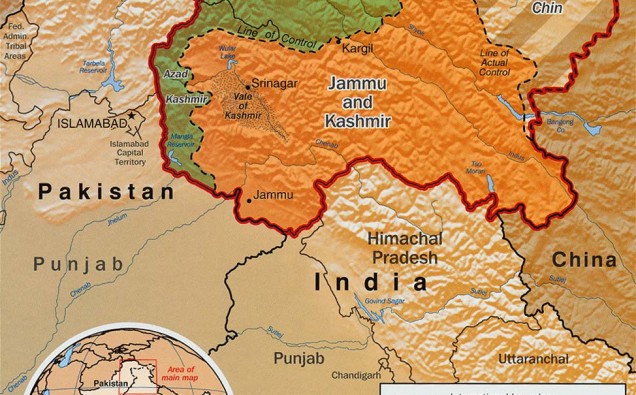
Kashmir on the Indian side of Line of Control continued to roil on Monday as violence killed 25 people, mostly Kashmir youth, amidst continuing protests over killing of a militant leader.
Indian forces killed Burhan Muzaffar Wani, commander of Hizbul Mujahideen, in the south of Kashmir on Friday, sparking spontaneous protests in the Indian-controlled valley with a Muslim-majority population.
This is the first time since 2010 that the Kashmiris have taken their grievances to the streets of Srinagar and other towns. A policeman was also killed. According to Police, the majority of Kashmiris killed are young people. Police have also claimed that the protestors pelted the police and were trying to attack military installations including an airbase.
Kashmir is a disputed territory according to UN Security Council resolutions and both India and Pakistan have claimed it since their 1947 independence from Britain. India and Pakistan have fought two full scale wars over Kashmir in 1948 and 1965 and a limited Kargil conflict in 1999.
Chief Minister of Indian held Kashmir Mehbooba Mufti appears unable to cope with the situation as the Valley as it boils. On the other hand Kashmiri resistance groups especially Hurriyat Conference have joined hands against what they call as atrocities committed by the Indian forces in the valley.
Islamabad has condemned Indian use of force against unarmed people. Prime Minister Nawaz Sharif, Opposition leader Syed Khurshid Shah and heads of other parties share the position. Analysts in both Pakistan and India warn that the use of brute forces while completely ignoring grievances and sentiments of Kashmir would result weder regional insecurity, when India and Pakistan dialogue remains frozen. Kashmir had become a nuclear flash point for South Asia in 1990s, when a spontaneous uprising saw much bloodshed and ratcheting up of tensions between Islamabad and New Delhi.
Some Indian media reports and commentators also asked New Delhi to find a political recourse.
Vindo Sharma, writing in the Hindustan Times said dialogue alone can pull Kashmir out of abyss.
“If not politically doused, the indigenous nature of the Kashmiri rebellion could outshout pro-India voices in the border state.”
Explaining some of the reasons for the latest unrest, Ishfaq Ahmed Shah noted in Quartz India a harmful absence of New Delhi’s resolve to seek a political settlement.
“The people of Kashmir see India as an aggressor and an occupier. It is occupying this land against their wishes,” said Showkat A Motta, editor-in-chief of The Kashmir Narrator, a Srinagar-based magazine, according to Quartz.
Meanwhile, The Times of India reported that Prime Minister Narendra Modi will review the Kashmir situation on Tuesday.














